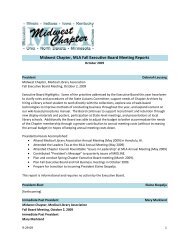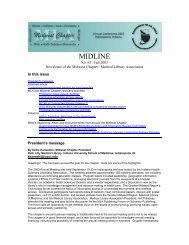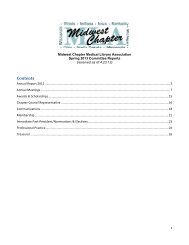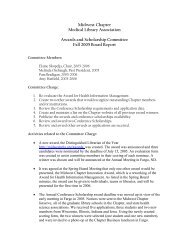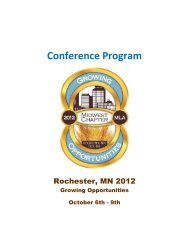the final program updated September 2. - Midwest Chapter MLA
the final program updated September 2. - Midwest Chapter MLA
the final program updated September 2. - Midwest Chapter MLA
You also want an ePaper? Increase the reach of your titles
YUMPU automatically turns print PDFs into web optimized ePapers that Google loves.
Contributed Papers and Bios Routes to Discovery 2005<br />
Sunday, Sept. 18, 1:30 – 3:30 pm<br />
Concurrent Session III – Executive Room<br />
Paper IX – 1:30 pm (Executive Room)<br />
The “Integrated” Academic Health Science Library<br />
David W. Boilard & Barbara McNamee<br />
Academic health science libraries have reached a level of evolution where <strong>the</strong> possibilities for contributing to <strong>the</strong><br />
mission of <strong>the</strong>ir institutions are nearly endless. In fact, <strong>the</strong>re are more options than <strong>the</strong>re are funds or staff to<br />
exploit. What occurs, <strong>the</strong>n, are libraries discovering <strong>the</strong>ir institutions’ most pressing or distinctive needs and<br />
evolving in ways that center <strong>the</strong>ir efforts on those needs. The “integrated library” is <strong>the</strong> evolutionary model that<br />
librarians developed and use with success at <strong>the</strong> Medical University of Ohio (MUO). It involves direct librarian<br />
integration into <strong>the</strong> institution’s educational, research, clinical and social fabrics to varying degrees, including faculty<br />
appointments to academic departments. It increases <strong>the</strong> currency of <strong>the</strong> library as a vital and integral unit in <strong>the</strong><br />
university, and fosters respect for librarians as multi-talented health center professionals. This, in turn, lends to<br />
viability during times of financial exigency, and enables <strong>the</strong> library to be <strong>program</strong>matically and politically proactive<br />
ra<strong>the</strong>r than reactive. Of even more note, it is also professionally and personally enriching. This paper explores <strong>the</strong><br />
dimensions of <strong>the</strong> “integrated library” at MUO and reveals <strong>the</strong> strategies devised to accomplish it.<br />
David W. Boilard has been director of <strong>the</strong> library for <strong>the</strong> Medical University of Ohio in Toledo since 1991.<br />
Previously he was library director at <strong>the</strong> University of North Dakota’s Harley E. French Library of <strong>the</strong> Health<br />
Sciences. He has also worked at <strong>the</strong> University of Michigan and <strong>the</strong> University of South Dakota. He received a<br />
master of library science degree from <strong>the</strong> University of Michigan in 1976, and a master of public health from <strong>the</strong><br />
Northwest Ohio Consortium for Public Health (three universities) in 2001. Mr. Boilard has served in a number of<br />
leadership positions in <strong>the</strong> Medical Library Association and o<strong>the</strong>r library organizations, including president of <strong>the</strong><br />
<strong>Midwest</strong> <strong>Chapter</strong> of <strong>MLA</strong> in 1996. In 1994, he received <strong>MLA</strong>’s Estelle Brodman Award of Academic Librarian of <strong>the</strong><br />
Year.<br />
Barbara McNamee is <strong>the</strong> assistant director for library services at <strong>the</strong> Raymon H. Mulford Library, Medical<br />
University of Ohio, Toledo. She received <strong>the</strong> A.M.L.S. from <strong>the</strong> University of Michigan in 1983 with a concentration<br />
in health sciences librarianship. Prior to coming to <strong>the</strong> Mulford Library, she was with <strong>the</strong> Houston Academy of<br />
Medicine-Texas Medical Center Library in Houston. In addition to health sciences librarianship, Ms. McNamee has<br />
been a school librarian and a public library manager. She participates in diversity initiatives at MUO and regularly<br />
facilitates MED1 problem-based learning groups.<br />
Paper X – 2:00 pm (Executive Room)<br />
Road to Instruction with Pediatric Residents:<br />
EBM Journal Club<br />
Gurpreet K. Rana<br />
Taubman Medical Library and <strong>the</strong> University of Michigan’s Department of Pediatrics have partnered in <strong>the</strong> past year<br />
to promote information literacy and evidence-based medicine searching skills among second-year pediatric<br />
residents through <strong>the</strong>ir weekly EBM journal club. The goals of <strong>the</strong> journal club include promoting EBM skills as part<br />
of lifelong learning to improve patient care, developing a well-built clinical question from a clinical scenario,<br />
understanding key search terms and using <strong>the</strong>m to identify relevant literature, and critically appraising a journal<br />
article. Residents are required to present <strong>the</strong>ir critically-appraised article and search methodology at journal club.<br />
During <strong>the</strong>ir preparation process most residents consult with our clinical librarian for instruction and support. In<br />
<strong>the</strong>se one-on-one consultations, <strong>the</strong> librarian covers developing search strategies, proper use of MeSH,<br />
understanding <strong>the</strong> nature of <strong>the</strong> Ovid and PubMed interfaces and exploration of biomedical sources beyond<br />
MEDLINE. At presentation time, <strong>the</strong> librarian takes part in discussing <strong>the</strong> resident’s literature search methodology<br />
with <strong>the</strong> o<strong>the</strong>r residents and clinical faculty. In this paper, <strong>the</strong> presenter will share techniques used in teaching EBM<br />
searching skills to residents and lessons learned from this unique opportunity.<br />
Gurpreet K. Rana is clinical librarian at Taubman Medical Library at <strong>the</strong> University of Michigan - Ann Arbor. In this<br />
position, she coordinates <strong>the</strong> Clinical Librarian Service, to provide instruction and support in <strong>the</strong> use of biomedical<br />
and evidence-based information resources for clinical faculty and residents at point of care. She holds a B.Sc. in



